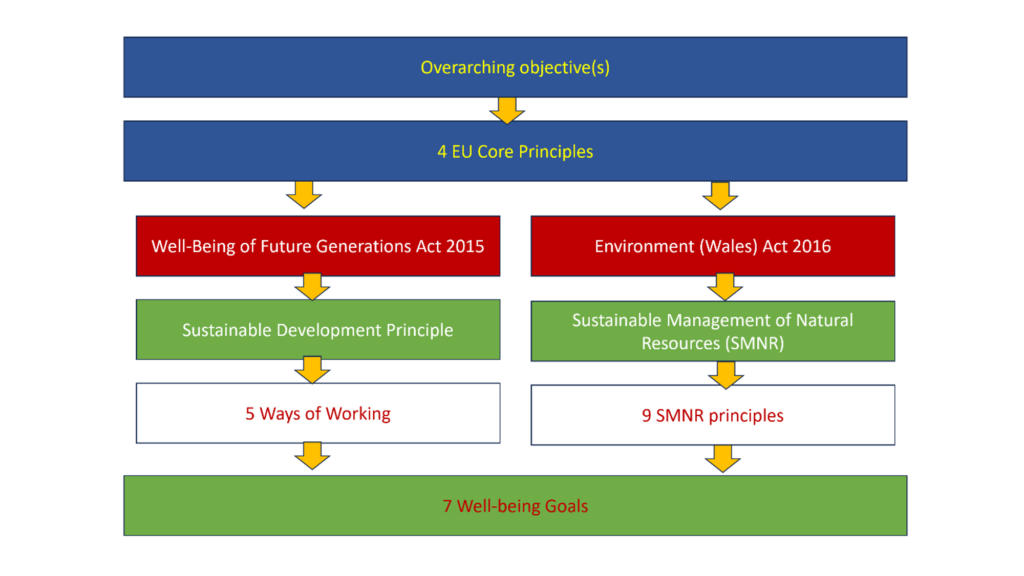The long way to a ‘principled’ Brexit in Wales: from the 2020 Task Group to the 2024 Consultation

A different approach, a sense of superiority, and uncertainty as to what the new regime would mean can all explain how the UK in the early days of EU membership earned the moniker of the ‘dirty man of Europe’. In the immediate aftermath of the 2016 Referendum, if there was one part of the UK where environmental ambition was clearly stated it was Wales – after all, it had passed two important pieces of legislation in 2015 (the Well-being of Future Generations Act) and 2016 (Environment (Wales) Act). Yet in a weird echo to the UK’s EU experience, Wales since Brexit has been resting on its laurels – and dragging its feet. Not on environmental policy per se, where Wales has been innovating or leading the way on plastics, glue traps or soundscapes, but on governance.
Wales is the only part of the UK that still has to establish a non-interim regulator (as we discuss here) and to address the future status of EU environmental principles. Wales is now in a unique position in terms of principles. As the last part of the UK to move on this critical aspect of environmental governance, it can learn from, not only the EU status quo but the emerging approaches to principles in England and Northern Ireland (following the Environment Act 2021) and Scotland (following the Continuity Act 2021). This blogpost is part of a series of three reacting to the on-going Welsh consultation “Securing a Sustainable Future Environmental Principles, Governance and Biodiversity targets for a Greener Wales”. Our first post looks at the proposed regulator and how it compares to regulators in the rest of the UK, arguing the Welsh proposal may be trying to do too much, with limited resources. This post compares the proposal on principles to what came out of the Environment Governance Task Group report of 2020, a group which brought together representatives from industry, NGOs and academia as we already wrote about in early 2021. The third post compares the principles proposal to what emerged in the rest of the UK and argues for a re-think in how Wales is addressing this issue.
A Welsh way for principles?
What would happen to environmental principles after Brexit has been exercising experts since at least 2017 (see Nigel Haigh’s post on an unprincipled Brexit). The issue gained political momentum with Lord Krebs’s successful amendment to the EU Withdrawal Act 2018 which called for both independent governance body or bodies and listed nine principles to be preserved (including Aarhus rights). Using Haigh’s expression, after Krebs, Brexit would be ‘principled’. But the devolution of environmental powers meant that different principles could be enshrined, and differently so, in each part of the UK.
Wales conducted a consultation on governance in 2018, followed by the Task Group which made six key recommendations in its 2020 report.
- Using primary legislation, not simple policy guidance, to better integrate the principles into Welsh law.
- Carrying over not only the four EU environmental principles (rectification at source, polluter pays, precaution, prevention) but also an overarching objective of a high level of environmental protection, or objective(s) to guide their application, alongside the principle of integration, to mainstream environmental ambition throughout government.
- For that overarching objective and those EU principles to sit above home-grown Welsh principles and hereby infuse all environmental action in Wales from the top (see Figure 1 below).
- To take this opportunity of reflection on principles to not only carry over EU principles but to (a) extend application of some of the Welsh principles, e.g. Sustainable Management of Natural Resources to be extended to other Welsh public bodies (including ministers) beyond Natural Resources Wales and (b) to clearly articulate the Aarhus Convention rights in the same piece of primary legislation alongside the EU principles.
- For Ministers to have a duty to apply those principles –akin to the wording in the Environment (Wales) Act where for example in drawing up Biodiversity Lists, “the Welsh Ministers must apply the principles of sustainable management of natural resources”.
- For those principles to be applied at the policy/legislation development stage (in contrast to the EU where they are both used by EU decision-makers when agreeing policy and by the Court when interpreting EU law).

To what extent is the 2024 consultation delivering on the Task Group’s recommendations?
Most of the recommendations from the Task Group were accepted by the Welsh government. Yet the 2024 consultation does differ in key parts from the Task Group proposals. A key difference is, as mentioned above, the lack of speediness from the Welsh Government to address such governance gaps whilst the Task Group wanted a final regime in place for the start of 2021.
As Figure 2 below summarises, there are another three noteworthy differences from the Task group recommendations: how the integration principle is treated (as just another environmental principle), in the lack of mention of Aarhus Convention Rights (access to environmental justice, participation and information) and in the duty on Ministers (have due regard, not apply).
| Taskgroup recommendation 2020 | Welsh Government 2024 Consultation |
| Primary legislation, not guidance | Both primary legislation and guidance |
| Developing overarching objectives, carrying over 4 core principles and integration | Overarching objectives and 5 principles (integration alongside the other 4) |
| Former EU principles and objectives to sit above Welsh principles | Former EU principles and objectives to sit “at highest level” and “cascade into operational policy” |
| Expand scope of Welsh principles and formally integrate Aarhus Convention Rights | No mention of expanding the scope of Welsh principles or integrating the Aarhus Convention |
| Ministers have to apply principles | Ministers to have due regard to principles and guidance explaining them |
| Principles to be applied at policy and legislation development stage | Principles to be applied at policy and legislation development stage |
In conclusion, in making those changes the Welsh government is moving away from a profoundly different Welsh approach to principles and moving closer to what the rest of the UK has done. Our next post compares the emerging Welsh approach to more established approaches in Scotland, Northern Ireland and England and ask whether Wales should as much as possible follow suit or instead try to maintain and indeed further develop a different way of being ‘principled’.




